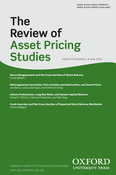
Review of Asset Pricing Studies
Scope & Guideline
Pioneering Analyses in Economics and Finance
Introduction
Aims and Scopes
- Asset Pricing Models and Theories:
The journal emphasizes the development and testing of asset pricing models, including multifactor models and the intertemporal capital asset pricing model (ICAPM). Researchers contribute to the theoretical underpinnings of how asset prices are determined in financial markets. - Market Microstructure and Trading Behavior:
Studies often focus on the intricacies of market microstructure, including the effects of trading behavior, short selling, and the role of liquidity. This area explores how these factors influence asset pricing and market efficiency. - Risk Factors and Return Predictability:
The journal investigates various risk factors and their impact on return predictability across asset classes, including equities and bonds. This includes exploring characteristics such as size, value, and momentum. - Regulatory and Economic Impacts on Asset Pricing:
Research highlights the effects of regulatory changes and macroeconomic conditions on asset pricing, addressing how these external factors shape market dynamics and investor behavior. - Behavioral Finance and Investor Psychology:
The journal includes studies that incorporate behavioral finance principles, examining how investor psychology and sentiment affect asset pricing and market trends.
Trending and Emerging
- Cryptocurrency and Digital Assets:
There is a growing body of research focusing on the pricing mechanisms and investor behavior related to cryptocurrencies and digital assets, highlighting their increasing significance in the financial ecosystem. - Impact of Macro-Financial Dynamics:
Studies examining the interplay between macroeconomic indicators and asset pricing have gained prominence, suggesting a heightened interest in understanding how macroeconomic conditions influence market behavior. - Behavioral Insights into Investment Practices:
An emerging trend is the integration of behavioral finance concepts into asset pricing research, exploring how psychological factors and investor sentiment shape market outcomes and asset valuations. - Regulatory Effects on Market Behavior:
Research focusing on the implications of regulatory changes, such as short-selling regulations and their impact on market efficiency and pricing, has become more prevalent, reflecting the importance of policy in shaping financial markets. - Advanced Portfolio Management Strategies:
There is an increasing emphasis on innovative portfolio management strategies, including the use of machine learning and alternative data, to enhance asset pricing models and improve investment outcomes.
Declining or Waning
- Traditional CAPM Applications:
Research applying the Capital Asset Pricing Model (CAPM) has become less frequent, as scholars increasingly explore more complex and multifactor models that better capture the nuances of asset pricing in modern markets. - Focus on Historical Data Analysis:
There has been a noticeable decrease in studies that rely solely on historical data analysis without integrating contemporary market phenomena or advanced methodologies, indicating a trend toward more dynamic and forward-looking approaches. - Simple Return Predictability Models:
The exploration of simplistic return predictability models has waned as researchers shift towards more sophisticated techniques that incorporate macroeconomic variables and behavioral insights, reflecting a broader understanding of market complexities.
Similar Journals
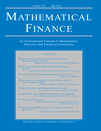
MATHEMATICAL FINANCE
Cultivating Insights in Mathematical FinanceMATHEMATICAL FINANCE is a prestigious journal published by Wiley, focusing on the interdisciplinary fields of finance, applied mathematics, accounting, and economics. With its ISSN 0960-1627 and E-ISSN 1467-9965, this journal has earned its place in the top tier of academic publications, reflected by its Q1 rankings across multiple categories in 2023, including Accounting, Applied Mathematics, Economics and Econometrics, Finance, and Social Sciences. MATHEMATICAL FINANCE, which commenced publishing in 1991, is recognized for its rigorous peer-review process and its significant contribution to the advancement of knowledge in quantitative finance methodologies and risk management practices. Although it does not currently offer open access, the journal remains an invaluable resource for researchers, professionals, and students seeking to stay abreast of the latest theoretical advancements and empirical studies in mathematical finance. Its impact factor and Scopus rankings further illustrate its high standing within the academic community, making it an essential platform for impactful research and scholarly discourse.
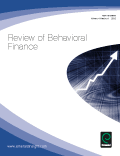
Review of Behavioral Finance
Uncovering Behavioral Insights to Transform FinanceReview of Behavioral Finance is a distinguished journal published by Emerald Group Publishing Ltd, focusing on the dynamic interplay of psychology and finance. With an ISSN of 1940-5979 and an E-ISSN of 1940-5987, this journal serves as a pivotal platform for researchers, professionals, and students keen on exploring innovative behavioral financial practices. Operating from the United Kingdom, the journal has made significant strides since its inception in 2009, converging years up to 2024. It is well-regarded in its field, achieving Q2 rankings in Accounting, Finance, and Strategy and Management for 2023, reflecting its influential contributions to these domains. The journal's rigorous peer-review process guarantees the quality of published research, making it an essential resource for academics seeking to enhance their understanding of behavioral finance. While the journal does not currently offer open access, it remains accessible through various academic databases, facilitating the dissemination of vital financial insights. Engage with the cutting-edge research that shapes the future of finance today!
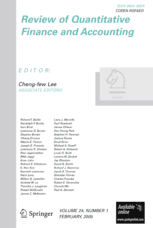
Review of Quantitative Finance and Accounting
Innovating Financial Solutions Through Quantitative MethodsThe Review of Quantitative Finance and Accounting, published by Springer, is a distinguished academic journal that has been at the forefront of scholarly discourse since its inception in 1991. With an ISSN of 0924-865X and an E-ISSN of 1573-7179, this journal specializes in the interdisciplinary realms of accounting and finance, particularly emphasizing quantitative methodologies and their applications in real-world scenarios. With an impressive track record reflected in its 2023 rankings, it sits in the Q2 category across key fields such as Accounting, Business Management, and Finance, demonstrating its relevance and influence within these domains. Although it operates without an Open Access option, the journal's content remains vital for researchers, professionals, and students aiming to deepen their understanding of quantitative approaches in finance and accounting contexts. The Review of Quantitative Finance and Accounting stands as an essential resource for advancing knowledge and fostering innovation within these critical disciplines.

Journal of Investment Management
Bridging Theory and Practice in Investment Management.The Journal of Investment Management, with ISSN 1545-9144 and E-ISSN 1545-9152, is a prominent platform dedicated to the dissemination of cutting-edge research in the field of investment management. Published by JOURNAL INVESTMENT MANAGEMENT, this journal aims to bridge the gap between theoretical foundations and practical applications, catering to the needs of researchers, professionals, and students alike. With a focus on contemporary issues influencing investment strategies, asset allocation, risk management, and financial innovation, this journal provides valuable insights and methodologies to enhance investment decision-making processes. While currently not operating under an open-access model, the journal is accessible through various academic databases, ensuring that its critical findings reach a wide audience across the globe. Emphasizing the significance of empirical research and analytical rigor, the Journal of Investment Management plays a crucial role in shaping the future of investment practices and academic discourse in this dynamic field.

Annals of Finance
Unlocking the Complexities of Modern FinanceThe Annals of Finance, published by Springer Heidelberg in Germany, stands as a pivotal journal within the realms of Economics, Econometrics, and Finance. With a dedicated convergence of research from 2005 to 2024, this esteemed publication features thought-provoking articles that address both theoretical and practical aspects of finance, earning it a commendable Q2 category ranking in the 2023 metrics for both Economics, Econometrics and Finance as well as Finance. The journal serves an essential role in disseminating knowledge and fostering advancements in the field, appealing to researchers, professionals, and students alike. Its rigorous peer-review process ensures the integrity and quality of published works, making it a reliable source for cutting-edge findings and discussions within the finance community. For those looking to navigate the complexities of modern finance through rigorous research, the Annals of Finance is an invaluable resource.
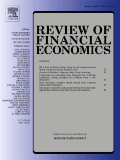
Review of Financial Economics
Contributing to the Evolution of Financial ThoughtReview of Financial Economics, published by WILEY, stands as a prominent peer-reviewed journal in the fields of economics and finance. Established in 1994, this journal provides a platform for rigorous research and thoughtful discourse, contributing to the advancement of knowledge in financial theory and its applications. With an HIndex indicative of its citation impact, it ranks in the Q3 quartile for both Economics and Econometrics, as well as Finance, based on the 2023 categorization, underscoring its role in the academic community. Although it does not currently offer Open Access, the journal remains accessible to a wide audience through institutional subscriptions. Researchers, professionals, and students are encouraged to engage with its insightful articles that address contemporary issues and advancements within financial economics, fostering a deeper understanding of the complex interplay between economic systems and financial markets.
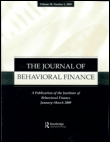
Journal of Behavioral Finance
Advancing Knowledge at the Intersection of Mind and MoneyThe Journal of Behavioral Finance is a pivotal publication examining the intersection of psychology and finance, offering insights into the behavioral aspects that influence financial decision-making. Published by Routledge Journals, Taylor & Francis Ltd in the United Kingdom, this journal provides a platform for researchers and practitioners to engage with cutting-edge research that covers diverse topics such as investor behavior, market dynamics, and emotional finance. With an ISSN of 1542-7560 and an E-ISSN of 1542-7579, the journal has established itself with an impressive standing, achieving a Q2 ranking in Finance and a Q3 ranking in Experimental and Cognitive Psychology according to the 2023 category quartiles. Furthermore, it ranks in the top 74th and 73rd percentiles in their respective fields within Scopus. The Journal of Behavioral Finance not only disseminates scholarly research but also fosters critical discourse, essential for academics, industry professionals, and students seeking to deepen their understanding of behavioral finance dynamics.

Journal of Derivatives
Empowering Researchers with Cutting-Edge Findings.Welcome to the Journal of Derivatives, a premier platform for the dissemination of cutting-edge research in the fields of Economics, Finance, and Econometrics. Published by PAGEANT MEDIA LTD, this esteemed journal has been a vital source of knowledge since its inception in 1996, with a commitment to fostering academic excellence through rigorous peer-reviewed studies. Though it presently does not operate under an open access model, the journal continues to maintain a respectable presence within its field, recognized as Q3 in both Economics and Finance as of 2023. Researchers and practitioners alike will find valuable insights and innovative methodologies, reflected in its competitive Scopus rankings, which place it among the best in its category. As the journal engages with a diverse array of topics related to derivatives and their applications, it serves as an essential resource for those seeking to deepen their understanding of financial instruments in today’s ever-evolving economic landscape. Join us in exploring the latest advancements and discussions in this critical area of study.

REVIEW OF INDUSTRIAL ORGANIZATION
Shaping the future of organizational behavior and strategy.REVIEW OF INDUSTRIAL ORGANIZATION, published by SPRINGER, is a premier journal dedicated to advancing the field of industrial organization and related disciplines. With its ISSN 0889-938X and E-ISSN 1573-7160, this esteemed publication supports the dissemination of high-quality research from 1984 to the present, encompassing a wide range of topics such as economics, technology management, and organizational behavior. Positioned in the Q2 category across multiple disciplines, including Economics and Econometrics, Strategy and Management, and Organizational Behavior, it reflects its impactful contributions to academia and business practice. The journal provides valuable insights for researchers, practitioners, and students interested in the dynamics of market structures, competition, and regulatory issues. As part of the Scopus database, it ranks favorably, allowing authors to contribute to a recognized platform that drives innovation and policy in the industrial sector. While it does not offer open access, the journal's robust editorial standards ensure that published work meets rigorous scholarly criteria, making it an essential resource for those aiming to deepen their understanding of industrial organization.
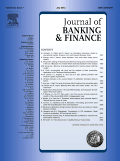
JOURNAL OF BANKING & FINANCE
Your Gateway to Cutting-Edge Financial ResearchWelcome to the Journal of Banking & Finance, a premier publication in the fields of finance and economics, expertly published by Elsevier. With its esteemed Q1 ranking in both the Economics and Econometrics and Finance categories for 2023, this journal frequently garners significant attention from researchers, professionals, and academics alike. Established in 1977, it has become a crucial resource for the latest research and advancements in banking and financial services, influencing policies and practices on a global scale. The journal's commitment to high-quality, peer-reviewed content ensures that it not only contributes to academic discourse but also drives real-world financial innovation. As part of the respected Elsevier publishing collection, the journal's rigorous standards and comprehensive analysis serve as indispensable tools for those seeking to understand and navigate the complexities of the financial landscape. Located in the Netherlands, the Journal of Banking & Finance continues to play a vital role in shaping the future of financial research through its impactful insights and research contributions.